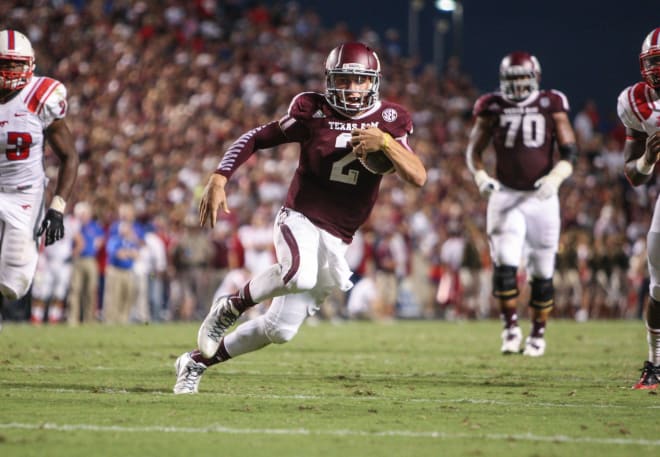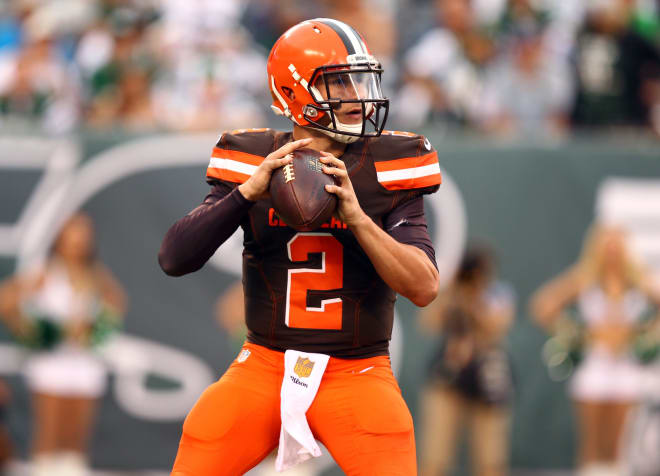Hard not to think 'What if?' with Johnny Football

I watched the new Netflix documentary Untold: Johnny Football on Tuesday night and I was left with only one question I kept asking myself throughout it:
What if?
What if Johnny Manziel, who was wildly under-ranked as a three-star coming out of Kerrville (Texas) Tivy, stayed with his Oregon commitment instead of flipping to Texas A&M? Could then-coach Chip Kelly have kept Manziel clean and on the right path to NFL stardom along with some adult guidance that he badly lacked from Texas A&M coach Kevin Sumlin and offensive coordinator Kliff Kingsbury, who knew Manziel was partying before games and didn’t seem to care much as long as he performed on Saturdays?
*****
MORE: Rivals.com introduces Comprehensive Team Rankings
FINAL 2023 TEAM RANKINGS: Comprehensive (overall) ranking | High school/JUCO ranking | Transfer portal ranking
CLASS OF 2024 RANKINGS: Rivals250 | Team | Position | State
CLASS OF 2025 RANKINGS: Rivals250 | Team | Position | State
TRANSFER PORTAL: Latest news | Transfer portal player ranking | Transfer portal team ranking | Transfer Tracker | Message board
*****
I wonder what Manziel would have turned out to be like - who was a cocksure quarterback like many of them but didn’t seem like an out-of-control boozehound in high school - if his balloon-head friend Nate wasn’t so close and wasn’t almost encouraging the bad behavior, whether it was the partying or the against-the-rules autograph signings that got Manziel in hot water with the NCAA.
As for his three-star ranking, we knew about Manziel putting up huge numbers in high school but it was in the Hill Country of Texas and not against elite competition. Plus at that time, we were hesitant about shorter quarterbacks being ranked super high, something that has taken a complete 180 since Manziel’s high school days. We missed on him, no doubt.
The next ‘what if’ when it comes to Manziel centers around if NIL was not against the rules back then. Basically, everything Manziel got in trouble for with the NCAA is now not only legal but almost encouraged in the recruiting process.
Sign some footballs and make some money? Then: Taboo. Now: Great, do it. Make money off jerseys or appearances? Then: No way. Now: That’s the name of the game.
I completely understand why Manziel said he has a “deep hatred” for the NCAA. The star quarterback basically raised millions for the school, funded in part the new Kyle Field and did so much free advertising for Texas A&M and got zilch for it other than just more national media scrutiny. Manziel should have been a millionaire while playing at Texas A&M. Maybe it would have cut out some of the BS but with Manziel, who can tell.
Former NCAA president Mark Emmert has a shameful history of making tons of money and lining the pockets of member institutions only to basically turn up his nose at the actual players making the money for them. I’m happy he’s still alive to see the NIL era completely circumvent everything he was attempting to do at the NCAA - stifle players from making bank while everyone else did.
But rules are rules and they should have been followed no matter who wrong or distasteful. Manziel was out of control not only signing autographs but traveling to Miami once a month to do it and I wonder how Sumlin or someone on Texas A&M’s staff could possibly not know where the star quarterback was half the time? Did Sumlin ever wonder (or did he just turn a blind eye) as to why LeBron James and Drake are hanging around Manziel?
Sumlin was a mess, Kingsbury was using Manziel’s success to parlay his own head coaching job and Manziel is also to blame because he could’ve acted like a semi-responsible person instead of a wild party animal and made some right decisions. Just some.

I do wonder if all this would have been different if Manziel played for Kelly all the way out in the Pacific Northwest. Or if he was recruited by Texas coach Mack Brown (who took QB David Ash in the 2011 class) and played at his dream school with some serious policing around him at the staff level. Sumlin screwed up but Manziel is responsible for himself.
Who really knows. Maybe Manziel wanted to be a train wreck. As hard as it is for some people to comprehend, some people sabotage their own success. He was diagnosed bipolar and clearly had alcohol and drug dependency issues that went unchecked for far too long.
Just look at the stories in the documentary about the pre-draft process.
Manziel is in San Diego training and doing great and there’s a public relations campaign designed by his agent to convince teams that what he did at Texas A&M off the field was the past and now he’s going to be a professional.
And then one week before the combine (where drug tests happen) he’s partying in the Hollywood Hills with celebs. A fake story about his dad being in the hospital was concocted to get him out of the combine early but Manziel didn’t learn his lesson, just another bullet he dodged on the way to more destructive antics.
Former Oklahoma and Dallas Cowboys coach Barry Switzer (who won a Super Bowl and college national titles) once reportedly called Manziel an “arrogant little prick.” Mel Kiper said pre-draft that Manziel does not belong in the top-25 picks.
He went No. 22 overall to the Cleveland Browns and fell further than expected but was still the second quarterback taken in that draft after Blake Bortles.
But then Manziel self-sabotaged there as well. He wouldn’t watch film. Literally zero tape. He refused to act professionally and the lowly Browns got rid of him. When that happened, Manziel said he “felt the biggest weight lifted off my shoulders ever.”
Manziel, the first player to ever win the Heisman Trophy as a freshman, lasted 15 games in the NFL, threw for seven touchdowns and seven picks and was sacked 19 times in 2015.
In the movie A Bronx Tale, Deniro tells his son: “The saddest thing in life is wasted talent.”
Nowhere is that more true than with Manziel. He had it all - the gifts, that unexplained magic, the athleticism, everything to be something special.
Instead, he drank too much, partied too much, had some kind of internal issues that he has definitely struggled with and, in the end, it’s just sad.
I kept coming back to ‘what if’ when watching that documentary. It seems now as a 30-year-old, Manziel sort of gets it, sometimes.
There’s no going back and more than anything, maybe Manziel’s gift to the sport of football - other than the memories of the miracles he pulled off at A&M - is that the next Johnny Manziel putting up huge stats and getting all the hoopla in the recruiting process won’t act in the same self-destructive way Manziel did.
I hope so.
